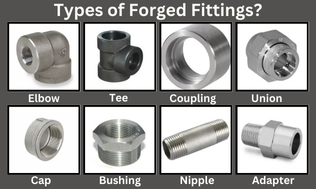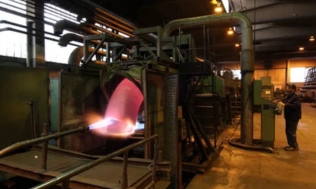What are Forged Fittings?
Forged fittings are pipe fittings that are made using a process called forging, where metal is shaped by applying high pressure. This results in fittings that are stronger and more durable than cast fittings. They are commonly used in high-pressure and high-temperature environments, such as in the oil, gas, and chemical industries, as well as in plumbing and construction.
Benefits of Forged Fittings
Forged fittings offer several advantages that make them a preferred choice in many industries:
High Strength: The forging process aligns the grain structure of the metal, which improves its strength and durability.
Durability: These fittings are built to last, withstanding wear and tear in harsh environments.
Corrosion Resistance: Many forged fittings are made from stainless steel, which resists corrosion, making them ideal for use in wet or corrosive environments.
Cost-Effective in the Long Run: Although forged fittings might have a higher upfront cost, their long lifespan and reduced maintenance needs make them a more economical choice in the long term.

What Are the Different Types of Forged Fittings?
Forged fittings come in several types, each designed for specific functions and applications. Here’s a closer look at the common types:
Elbow
Elbow fittings are used to change the direction of flow in a pipe system. They are typically available in angles like 45° and 90° to allow fluid or gas to flow in different directions. These are essential in any piping system where direction changes are necessary.
Tee
Tee fittings are used to split or combine the flow in three directions. They have a “T” shape and are commonly used in systems that require branch connections, allowing a single pipe to feed into multiple lines.
Coupling
Coupling fittings are used to join two sections of pipes together. They can connect two pipes of the same diameter or different diameters, making them flexible for various systems. They are often used when pipes need to be extended.
Union
Union fittings are similar to couplings but are designed to be easily disassembled. They allow two pipes to be connected but can be taken apart without needing to remove the entire section, making them useful for maintenance or repairs.
Cap
Cap fittings are used to seal the end of a pipe. They help close off a piping system temporarily or permanently, preventing any material from flowing through that section.
Bushing
Bushing fittings are used to reduce the size of a pipe. They allow a smaller pipe to fit into a larger one, which is often necessary when adapting to different sizes in a piping system.
Nipple
Nipples are short lengths of pipe with threads on both ends. They are used to connect two fittings or pipes in tight spaces where full-length pipes are not feasible.
Adapter
Adapter fittings are used when there’s a need to connect pipes or equipment with different sizes or threading types. They ensure compatibility between different parts of a piping system.

Forged Fittings Manufacturing Process
The manufacturing process for forged fittings ensures they are of high quality and can withstand demanding applications. The process includes:
- Material Selection: High-quality materials like stainless steel, carbon steel, or alloy steel are chosen to ensure durability.
- Heating: The material is heated to make it malleable and ready for shaping.
- Forging: The heated material is placed into a mold and shaped using high pressure, giving the fitting its form.
- Cooling: Once forged, the fitting is cooled to harden it.
- Machining: The forged fitting is then machined to meet precise dimensions and standards.
- Heat Treatment: Additional heat treatments may be applied to improve hardness or strength.
- Inspection and Testing: The fittings undergo quality checks and tests to ensure they meet required specifications.
- Surface Finishing: A final polishing or treatment is done to enhance the fitting’s surface, improving its corrosion resistance and appearance.
Conclusion
Forged fittings are an essential component in many piping systems, offering durability, strength, and resistance to corrosion. The price of forged fittings depends on factors such as material, size, and the complexity of the manufacturing process. On average, the price for standard forged fittings like elbows, tees, and unions can range from $5 to $50 per fitting, with more complex or larger fittings costing more. Choosing the right fitting depends on the specific needs of your piping system. Despite their higher initial cost, forged fittings provide long-term value by reducing the need for frequent replacements and ensuring reliable performance in demanding applications.




